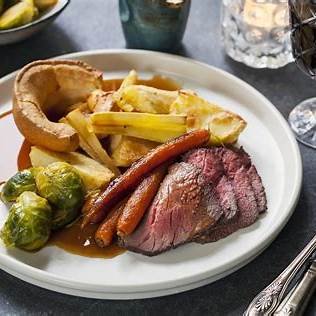
The British Sunday roast is more than just a meal; it is a cherished tradition that encapsulates the essence of British culinary identity and family values. This historical journey explores the origins, cultural significance, and evolution of the Sunday roast, highlighting its role in shaping a nation’s character and fostering familial bonds.
Origins of the Sunday Roast
The Sunday roast has roots that trace back to medieval times, with various theories regarding its inception. One prevalent belief is that it originated during the reign of King Henry VII in the late 15th century when royal guards were affectionately dubbed “Beefeaters” due to their love for roast beef. This period marked the beginning of a culinary tradition that would become synonymous with British culture.
Another theory suggests that the Sunday roast emerged as a reward for village serfs who would practice their battle techniques on Sundays after church. Following their training, they were often rewarded with roasted oxen, creating a celebratory meal to mark the end of a week of labor. This connection between food and social structure highlights how the Sunday roast served as both sustenance and a symbol of community.
The Evolution of the Sunday Roast
Historically, the preparation of the Sunday roast was practical. During the Industrial Revolution in the late 1700s, families would place a cut of meat in the oven before attending church. Upon returning home, they would find a hearty meal ready to be enjoyed. This method allowed families to maximize their time while ensuring they had a substantial meal to break their fast after church services.
The traditional components of a Sunday roast include roasted meat—often beef, but also lamb, chicken, or pork—served alongside roasted potatoes, Yorkshire pudding, and an array of vegetables such as carrots, peas, and Brussels sprouts. Gravy made from the meat’s juices is an essential accompaniment, enhancing both flavor and moisture.
Cultural Significance and Family Values
The Sunday roast is deeply embedded in British culture as a symbol of family unity and tradition. It is often seen as an opportunity for families to gather around the dining table, share stories, and enjoy each other’s company. The ritualistic nature of preparing and consuming this meal fosters connections among family members while reinforcing cultural values centered around togetherness.
In contemporary Britain, Sundays are often marked by bustling pubs and restaurants serving traditional roasts. These establishments provide spaces for families and friends to come together over hearty meals, continuing the legacy of communal dining that has persisted for centuries. The Sunday roast has become so ingrained in British life that it is frequently regarded as one of the nation’s favorite meals.
Modern Adaptations and Variations
While the classic elements of a Sunday roast remain popular, modern adaptations have emerged to cater to changing tastes and dietary preferences. Vegetarian and vegan alternatives are increasingly common, with options such as nut roasts or vegetable Wellington gaining popularity. Additionally, international influences have introduced new flavors and ingredients into traditional recipes.
Despite these adaptations, the core values associated with the Sunday roast—celebration, family bonding, and cultural heritage—remain intact. The meal continues to serve as a focal point for gatherings, reflecting both tradition and innovation within British cuisine.
The Role of Food in National Identity
The enduring legacy of the Sunday roast extends beyond mere sustenance; it plays a vital role in shaping national identity. The meal symbolizes British resilience and adaptability while reflecting historical narratives that have influenced culinary practices over time. The phrase “roast beef” has even become synonymous with English nationality itself, illustrating how food can embody cultural pride.
Furthermore, literary references such as Henry Fielding’s ballad “The Roast Beef of Old England” celebrate this dish’s significance within British culture. The song captures the essence of how food can evoke feelings of patriotism and nostalgia while reinforcing communal ties.
Conclusion: A Culinary Tradition That Endures
The British Sunday roast is an enduring culinary tradition that has evolved over centuries while remaining deeply rooted in family values and cultural identity. Its historical origins reflect societal changes throughout British history, while its modern adaptations showcase its relevance in contemporary life.
As families continue to gather around tables filled with roasted meats and hearty sides each Sunday, they partake in a ritual that transcends generations—a celebration not only of food but also of togetherness and shared heritage. The legacy of the Sunday roast serves as a reminder that food is more than nourishment; it is an integral part of our identities that shapes our connections to one another and our cultural histories.
